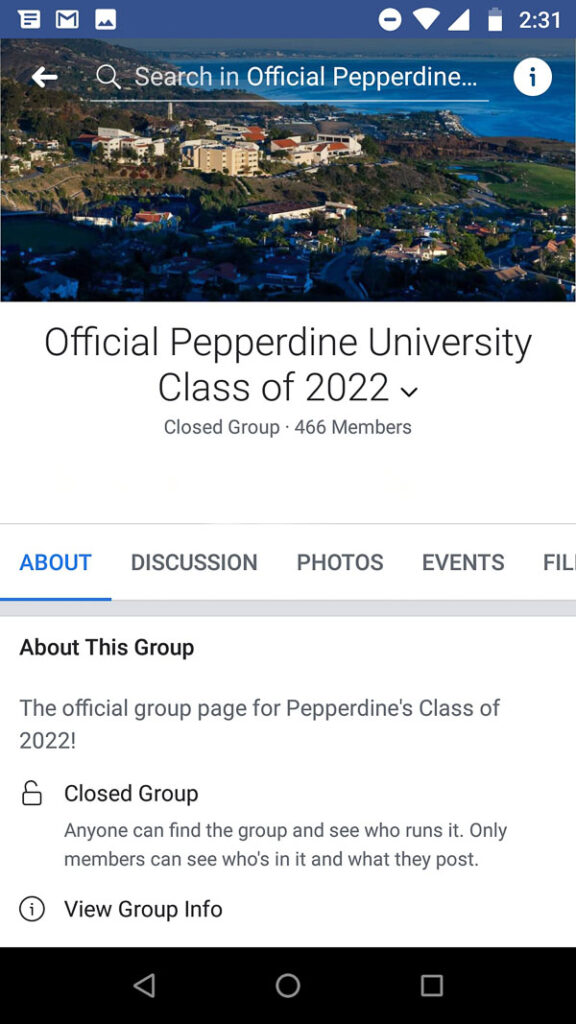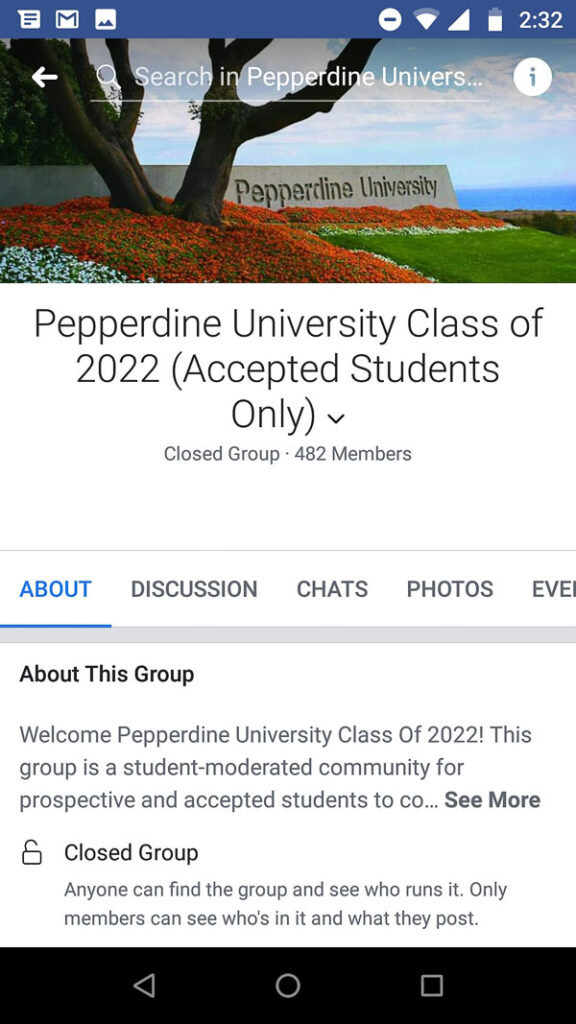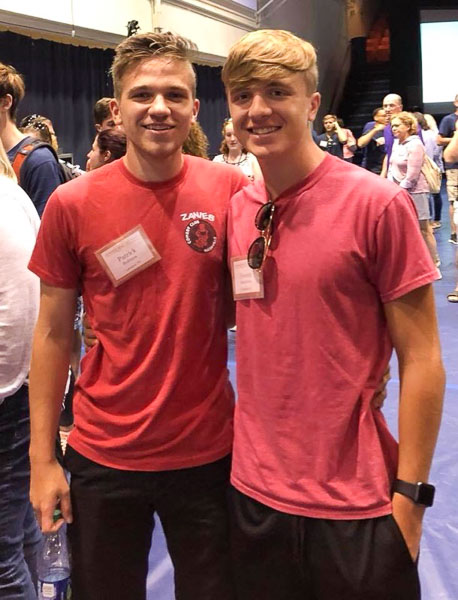
First-year Pepperdine students are feeling social pressures from social media before stepping on campus, whether they “like” it or not.
Between a class wide GroupMe chat started in January to “roommate dating” in May, social media sets a precedent for Pepperdine’s social sphere before new students even move in. Students are able to identify their peers from months of social media following but find themselves in an awkward predicament when it comes to actual interaction, similar to meeting a movie star.
In a Pepp Post poll of 57 first-year students, 88 percent said they interacted with Pepperdine students over social media before coming to campus but only 43 percent said their interactions translated into an in-person friendship.
“A lot of the people I follow on social media and did follow on social media before, I do not say hi to now,” freshman English major Alaina Housley said, “and that’s either because I’m anti-social or social media does not do that much for you.”
First-year students have learned to navigate the uncharted waters of fake Facebook groups, preconceived ideas about their peers and how to get involved before classes were even in session. For better or for worse, social media has become a key player in the college experience.
Facebook has earned its roots in the college experience. Mallory Holcomb, Pepperdine’s social media manager and Class of 2015 alumna, said her freshman class created their own Facebook group in early 2011 to help members find a roommate and meet people before coming to campus.
Facebook’s utility to freshmen is undeniable but it’s not always the university behind it.
Doug Hurley, the associate dean of Students, Student Activities and Campus Recreation, said in the past, third-party organizations created and ran Facebook groups for various colleges.
“Students were then lead to believe that this was a university page and that it was official,” Hurley said.”They were promoting local parties and bars and there were all these pictures of student with red cups. Well none of them were Pepperdine kids but freshmen didn’t know that and there’s nothing we can do about it.”There are two main Facebook groups for Pepperdine’s freshmen, the “Official Pepperdine Class of 2022” group and “Pepperdine University Class of 2022 (Accepted Students Only).” Ben Holcomb, a member of Seaver’s marketing team, runs the the “Official Pepperdine” group, but a man completely unaffiliated with the university maintains the “Accepted Students Only” group.


There is no discernable difference between the two groups. Both have more than 400 members and share information about upcoming deadlines, events on campus and ways to get involved. There is a mixture of posts from upperclassmen selling textbooks, to journalism students looking for opinions via polls, and hundreds of posts freshmen made describing themselves and their interests for future roommates to find.
In the poll, 81 percent said they were members of one or both of these Facebook groups.
“[The group] is just to provide incoming students an official place to communicate before NSO,” Ben Holcomb said via email. “We don’t create much content – if at all – for that group, and only monitor it when people report spam or posts of people who aren’t actually in the class.”
The administrator for “Pepperdine University Class of 2022 (Accepted Students Only)” did not respond to multiple requests to comment.
GroupMe
GroupMe is a messaging app in which people can connect with others in a group setting. The app connects to your Facebook profile or you can create a separate account for GroupMe.
Alexandra “Allie” Coates, a freshman business administration major, first started a Pepperdine
Class of 2022 group on GroupMe in January.
The group provided a place for incoming students to get to know their peers in a more personal social sphere, messaging with each other directly rather than posting in the Facebook group.
Members of the group, such as Lauren Drake, a freshman theatre arts acting major, said being a part of the GroupMe helped her know about upcoming deadlines for things like housing and medical records.
Alicia Yu, a freshman business administration major, said the group helped students to connect with others.
“Talking to the other kids made me want to go [to Pepperdine] more,” Yu said, “And it’s also nice that it’s a smaller school because the group chat was not overwhelming.”
But the group chat had downsides as well, Drake said.
“There were so many people being really fake,” Drake said. “Some people were nice but I didn’t meet anyone in the group chat that I talk to now.”
Yu said it was hard to keep up with the chat because of conflicting schedules, like during school when she was unable to keep up with notifications.
“There was some days where we would talk for like three hours about dramatic things,” Yu said, “and that was annoying because you want to step away to spend time and do things that you need to do but then you’re missing out on so much if you do that.”
The group had over 400 members until New Student Orientation in August, when it began to fall apart.
Yu said the group dissolved because a member changed the group name to “Bush’s baked beans are the best brand of beans” and started sending memes, which made people leave the group.
Roommates
Meeting one’s roommate is a defining moment in the college experience but because of social media, it’s becoming less of a surprise.
“Today, a growing number of students are bypassing [roommate matching] and making the choice themselves through online social networking,” Jenna Johnson wrote in a 2011 Washington Post article.
The trend continues at Pepperdine where the majority of students choose their roommates, Housing Director Robin Gore said.
Gore has worked in housing for universities for 16 years and has seen a trend with students “Facebook profiling” their roommate before coming to campus.
“Not until the last really five, maybe eight years, have we really been seeing this level of peer profiling and honestly I can’t definitively say that it’s social media or parental involvement,” Gore said. “We get phone calls in the summer of students or parents saying ‘We saw this picture, we saw this post, we saw this whatever, we don’t like it, we want our student to move.’”
Students, however, use social media sites to find a roommate on a more personal level.
Almost every student surveyed uses social media on a weekly basis, and the majority used social media to connect to their peers before coming to campus.
Freshman English major Patrick Robbins said he found his roommate through the “Pepperdine University (Admitted Students Only)” Facebook group.

“I noticed in one of his pictures he had a trombone and I played the trombone in middle school and freshman year, so I was like ‘hey, I play trombone,’ so I made contact there,” Robbins said.
Not everyone searches for a roommate through social media.
Freshman music major Ben Miller found his roommate through Pepperdine’s housing portal, StarRez, where students answer seven questions about their living habits like sharing, cleanliness and time dedicated to religious activities.
The design of StarRez is for students to match with peers with similar lifestyles and habits rather than personality traits or interests because dissimilar living habits cause the most conflict, Gore said.
Miller said he didn’t feel the need to be in a Facebook group or other social media platform.
“I knew I would be close with my suitemates and the people in my dorm just cause of how it’s set up,” Miller said. “I wasn’t too worried about that, didn’t feel like I needed to, just let it happen.”
The movie star effect
Incoming students who participate in a student-centered social media site feel better prepared to come to campus and interact socially, according to Michigan State University researchers’ psychology study “Serious social media: On the use of social media for improving students’ adjustment to college” published in “The Internet and Higher Education.”
But after coming to Pepperdine, first-year students are encountering a new problem. They have yet to meet the people they followed online.
Social media seems to be creating a “movie-star effect” for students where they can identify their peer by having followed them online but lack a genuine relationship or even interaction with them in person, Relationship IQ Director Kelley Haer said.
Miller said he saw a large increase in Instagram followers after he put “Pepperdine” in his bio and he followed back over 200 students because they also had “Pepperdine” or “Pepperdine ‘22” in their bios.
He said he has yet to meet all of the students he follows, and the Pepp Post survey found that 82 percent students are in the same place.
“I know there’s the phenomenon when you meet someone famous, people really struggle with what to say,” Haer said, “How do you say, ‘How was your day’ to a rock star? That just doesn’t feel natural because you know so much about their life they seem very other to you because they’re famous.”
The “movie-star effect” for first years is a diminished version of what one would feel when meeting a real celebrity, Haer said.
“When you know about somebody else, or when you even develop some sense of awe around who they’re like … when meet them you have these preconceived notions,” she said. “And it can be awkward or uncomfortable to know how to enter into natural conversation.”
Zoë Walsh, a freshman rhetoric and leadership major, said social media was helpful as a foundation for relationships as she able to use it as an “ice-breaker.”
“It did present a bit of a challenge,” Walsh said. “There was a bit of performance when you meet people after you’ve seen them on social media where you have to be like, ‘Yes! Tell me all these things that I already know about you.’”
Christopher Echevarria, a freshman political science major, said he chose not to participate in the Facebook group or GroupMe chat before coming to campus and did not follow students before coming to campus.
“I feel the most connected to people when I’m not scrolling through their feed,” Echevarria said, “Being away from social media gives me much more of a better opportunity to connect with others.”
Campus life
Campus life is more than just knowing people or knowing of people – it’s about staying involved. Pepperdine students hear about events, connect with their residence halls and learn about clubs all through social media, and especially through Instagram.
The poll found that 95 percent of students said they are on Instagram on a weekly basis, if not more.
There are more than 200 Instagram accounts associated with Pepperdine – from sports teams like Women’s Volleyball and Men’s Basketball, to Pepperdine International Program and residence halls like Peppers House or Knott House.
Mallory Holcomb and a senior intern run the official Pepperdine Instagram. Interns or current students maintain the other accounts, like Pepperdine Convocation or Campus Recreation, Mallory Holcomb and Hurley said.
Mallory Holcomb said the Pepperdine Instagram gives special attention to first-year students during the week of New Student Orientation but for the most part, the platform has a wide variety of objectives and target audiences that it’s trying to reach.
She also said she is aware of various “fun” student-run Instagram accounts like Overheard at Pepp, an account where students can anonymously submit things they’ve overheard on campus. While the university is trying to cut back on their number of social media accounts, Overheard at Pepp is not in danger of being shut down.
“I don’t want to be a police man over social media,” she said. “I’d love just for there to be more communication and community on social media, so if people feel more community by starting an account that brings people together, that’s awesome.”
Josie Utz is a senior business major and resident advisor for DeBell house and runs their Instagram account, Destination DeBell. Utz said the main goal behind the residence hall’s account is to “to show the little community we have and to show pride for DeBell.”
Haley Brouwer, a freshman political science major, follows a wide variety of Pepperdine social media accounts like Riptide and The Board to stay up to date.
“They offered me free stuff at some point and so I [followed them],” Brouwer said, “There were a couple that I followed when I was applying and trying to decide if I wanted to come here just to get a sense of what things were like – like the Pepperdine account and the Pepperdine IP account.”
But as prevalent as social media is, some students do not think social media is required to stay involved on campus. Echevarria, for example, said he does not feel excluded without Instagram or Facebook and that most people are understanding of his choice.
“It seems like people, even though they’re actively involved in social media,” he said, “everyone’s really aware of the downsides of it and the harm that it can cause to people, but everyone’s still actively participating in it.”
Over 66 percent of students polled in the Pepp Post survey said they feel social media is a requirement to stay active on campus for various reasons.
Social media is the “junk food” of communication, Haer said. While a little bit of junk food is OK, eating it excessively ruins your appetite.
“I see social media as the same,” she said, “If you’re popping M&M’s all day long, you’re not going to be hungry for dinner that night. If you’re on social media all day long, it’s taking up your time from when you could be having richer, more meaningful interactions, and it’s also covering over your appetite for real, happy, social relationships. It’s dulling your appetite – you’re just kind of getting the junk food of relationship.”
Mallory Holcomb said she believes the increase in social media use on campus is from both a cultural shift and a Pepperdine mindset.
“Social media use is skyrocketing year over year internationally, across the world, [and] at the same time, students at Pepperdine have started accounts – you know, you need to be on that account to know what’s going on in your dorm, so I think it’s both – students leaning into it, as well as cultural acceptance of using social as a main way to communicate.”
Ashley Mowreader completed the reporting for this story under the supervision of Dr. Christina Littlefield and Dr. Theresa de los Santos in Jour 241 in fall 2018. Dr. Littlefield supervised the web story.




